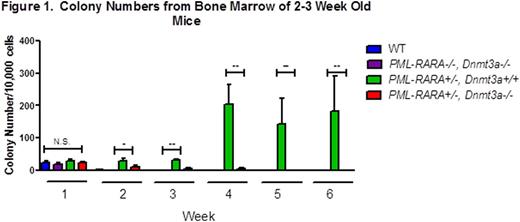We previously identified recurrent mutations in the DNA methyltransferase DNMT3A in patients with acute myeloid leukemia (AML). DNMT3A and the highly homologous gene DNMT3B encode the two methyltransferases that are primarily responsible for mediating de novo methylation of specific CpG residues during differentiation. Loss of Dnmt3a in hematopoietic stem cells impairs their ability to differentiate into committed progenitors (Challen et al Nat Gen 44:23, 2011). Importantly, DNMT3A mutations are mutually exclusive of the favorable prognosis AML-initiating translocations, including the t(15;17) translocation (which creates the PML-RARA fusion gene), and translocations involving MLL. PML-RARA has been shown to interact with DNMT3A in vitro (Di Croce et al Science 295:1079,2002), and to require DNMT3A to induce methylation and transcriptional silencing of a subset of specific target genes. These findings, and the lack of DNMT3A mutations in APL patients, suggest that PML-RARA may require functional DNMT3A to initiate leukemia. To investigate this possibility, we utilized a well-characterized transgenic mouse model (in a pure B6 background) in which expression of PML-RARA is driven in hematopoietic stem/progenitor cells by the mouse Cathepsin G locus (Ctsg-PML-RARA+/- mice). These mice spontaneously develop acute promyelocytic leukemia (APL) with high penetrance and long latency, and also exhibit a preleukemic phenotype marked by the accumulation of myeloid cells in bone marrow and spleen. In addition, myeloid progenitor cells derived from these mice have the ability to serially replate in methylcellulose cultures, demonstrating aberrant self-renewal. We generated Ctsg-PML-RARA+/- mice lacking Dnmt3a (PML-RARA+/- x Dnmt3a-/-) as well as mice in which conditional ablation of Dnmt3b in hematopoietic cells is driven by Vav-Cre (PML-RARA+/- x Dnmt3b fl/fl x Vav-Cre+). Loss of Dnmt3a completely abrogated the ex vivo replating ability of PML-RARA bone marrow (Figure 1). Although colonies from both PML-RARA+/- and PML-RARA+/- x Dnmt3a-/- mice appeared similar in morphology and number on the first plating, PML-RARA+/- x Dnmt3a-/- marrow ceased to form colonies with subsequent replating (see Figure), and cultured cells lost the expression of the myeloid marker CD11b. The same phenotype was also observed using bone marrow from both genotypes that was secondarily transplanted into wild type recipients, indicating that it is intrinsic to transplantable hematopoietic progenitors. Reintroduction of DNMT3A into bone marrow cells derived from PML-RARA+/- x Dnmt3a-/- mice with retroviral transduction restored replating ability and CD11b expression. Competitive repopulation experiments with PML-RARA+/- x Dnmt3a-/- marrow revealed a decreased contribution to peripheral lymphoid and myeloid cells at 4 weeks, relative to PML-RARA+/- or WT control animals. Finally, 12 weeks after transplantation, recipients of PML-RARA+/- x Dnmt3a-/- bone marrow did not display an accumulation of myeloid cells in the bone marrow and spleen. Importantly, bone marrow from PML-RARA+/- x Dnmt3b fl/fl x Vav-Cre+/- mice displayed no replating deficit or loss of CD11b expression ex vivo, indicating different functions for Dnmt3a versus Dnmt3b in this model. Finally, we interrogated the effect of Dnmt3a loss on bone marrow DNA methylation patterns using a liquid phase DNA capture technique that sampled ∼1.9 million mouse CpGs at >10x coverage. Loss of Dnmt3a caused a widespread loss of DNA methylation in whole bone marrow cells, with 36,000 CpGs that were highly methylated (methylation value >0.7) in the PML-RARA+/- and WT mice, but hypomethylated (methylation value <0.4) in Dnmt3a-/- and PML-RARA+/- x Dnmt3a-/- mice. Characterization of the effect of Dnmt3a loss on leukemia latency, penetrance, and phenotype in PML-RARA+/- mice is currently being defined in a tumor watch. In summary, we have demonstrated that PML-RARA requires functional Dnmt3a (but not Dnmt3b) to drive aberrant self-renewal of myeloid progenitors ex vivo, and that loss of Dnmt3a leads to widespread DNA hypomethylation in bone marrow cells, and abrogates preleukemic changes in mice expressing PML-RARA. This data may explain why DNMT3A mutations are not found in patients with APL initiated by PML-RARA.
Disclosures:
No relevant conflicts of interest to declare.
© 2013 by The American Society of Hematology
2013


